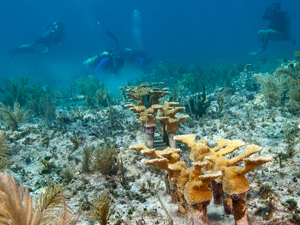By Clay Jackson, Deputy News Editor Pet Product News
Donations from the aquarium industry to the nonprofit Coral Restoration Foundation of Tavernier, Fla., have topped more than $40,000.
Aquarium industry leaders such as EcoTech Marine, Two Little Fishies, Piscine Energetics, Boyd Enterprises, Quality Marine, Ecoxotic and others have stepped up in recent years by sponsoring specific coral reef sites in the Florida Keys.
In all, eight aquarium product companies have donated at least $5,000 or more to sponsor the sites.
The once-glorious coral reefs abutting the Florida Keys have become some of the most degraded on Earth, according to the National Oceanic and Atmospheric Administration. Disease, rising seawater temperatures, declining water quality, anchor damage, overfishing and other problems has had deleterious effects on reef health in the Florida Keys and the Caribbean.
 Divers survey elkhorn coral colonies at the Coral Restoration Foundation’s offshore elkhorn coral nursery. Courtesy of Tim Grollimund/Coral Restoration Foundation |
Nedimyer’s organization has attracted many high-profile sponsors through the years, but it is the reef site sponsorships, other donations and the volunteerism of aquarium professionals and aquarists that hold special poignancy for insiders like Nedimyer and his operations manager, Kevin Gaines.
“Because we frag corals like hobbyists, we have gotten a lot of support from the industry,” Gaines said. “They use similar techniques in their aquariums, which can be applied to the big aquarium, the ocean.
“The trade gets a lot of undeserved bad press, but most aquarists care and want to give back,” Gaines continued. “They love the ocean.”
The foundation has received similar site donations—sponsorships of $5,000 or more for specific reefs—from hobbyist organizations such as the Atlanta Reef Club, the Orlando Reef Caretakers Association and even a pet store, The Aquatic Critter, in landlocked Nashville, Tenn.
A minimum $5,000 donation buys companies or individuals a mooring ball on a section of reef in the Florida Keys. Dive boats can tie to the big, white floating balls rather than drop an anchor, which can crush corals below.
The donations also pay for the fragging and outplanting of staghorn, elkhorn or both onto different reefs.
Staghorn and elkhorn are listed as threatened under the U.S. Endangered Species Act, and both are critical to the health of Floridian and Caribbean coral reefs. This is because both are fast-growing, reef-building corals that in a relatively short turnaround can transform a rubble pile into a reef and add much-needed cover for marine wildlife. These corals also can reseed adjacent areas during broadcast spawning events.
Staghorn and elkhorn corals reproduce asexually. Larger specimens can be fragmented into smaller pieces, and these frags can be planted elsewhere, where they continue to grow.
Gaines was recently joined on Molasses Reef by the three founders of EcoTech Marine of Bethlehem, Pa. It was EcoTech’s second time sponsoring Molasses Reef; the company sponsored a staghorn coral restoration effort there in 2011.
This time, the group outplanted elkhorn frags from the foundation’s offshore elkhorn nursery to the Molasses site, the first time nursery-raised elkhorn corals had been planted on a wild reef.
“EcoTech and the Coral Restoration Foundation share the same passion of working to protect coral reefs,” said EcoTech co-founder Tim Marks, who participated at Molasses Reef. “We hope our work together will help re-establish the colonies that once dominated the reefs but have been damaged in recent years.”
The foundation has two offshore coral nurseries—a 1-acre staghorn nursery and a smaller elkhorn nursery. The foundation is growing more than 25,000 staghorn corals offshore for future restoration efforts.
Anyone interested in sponsoring a reef through the Coral Restoration Foundation, may visit www.coralrestoration.org.